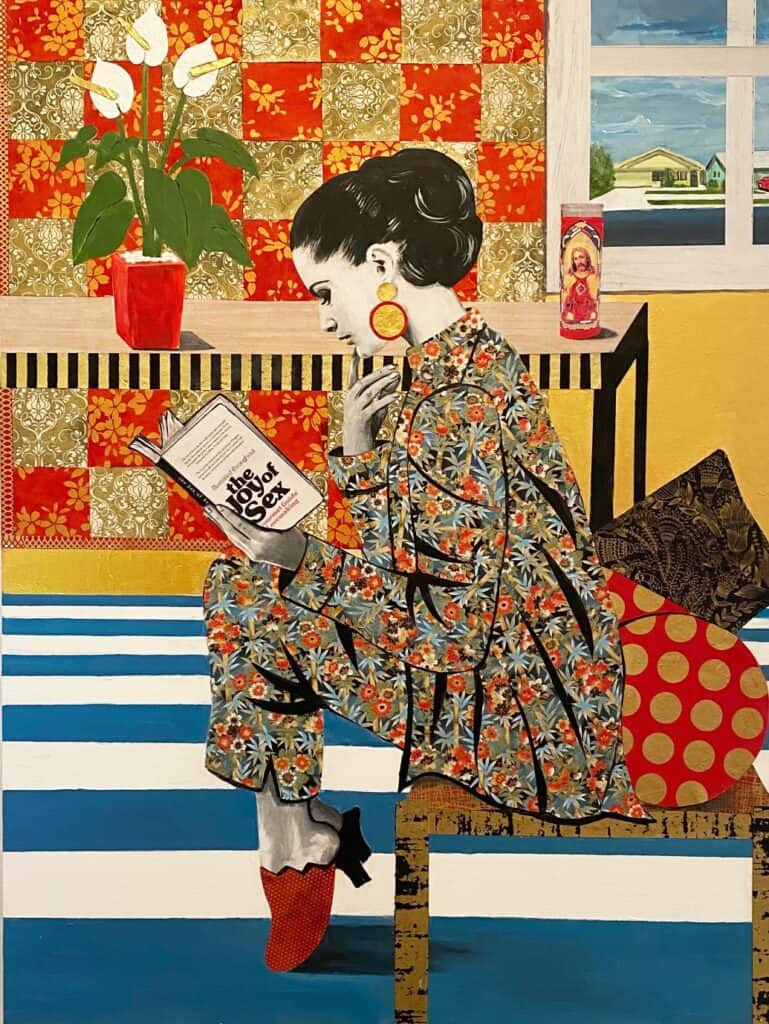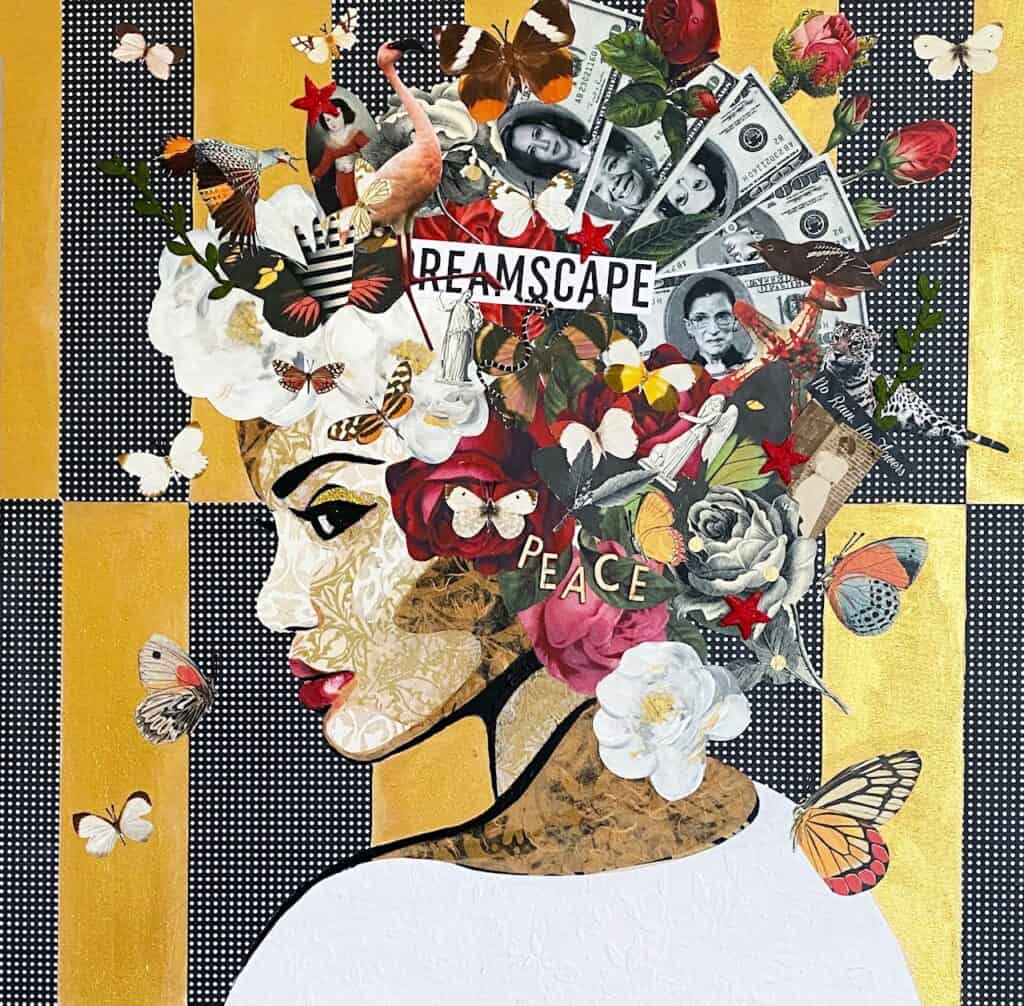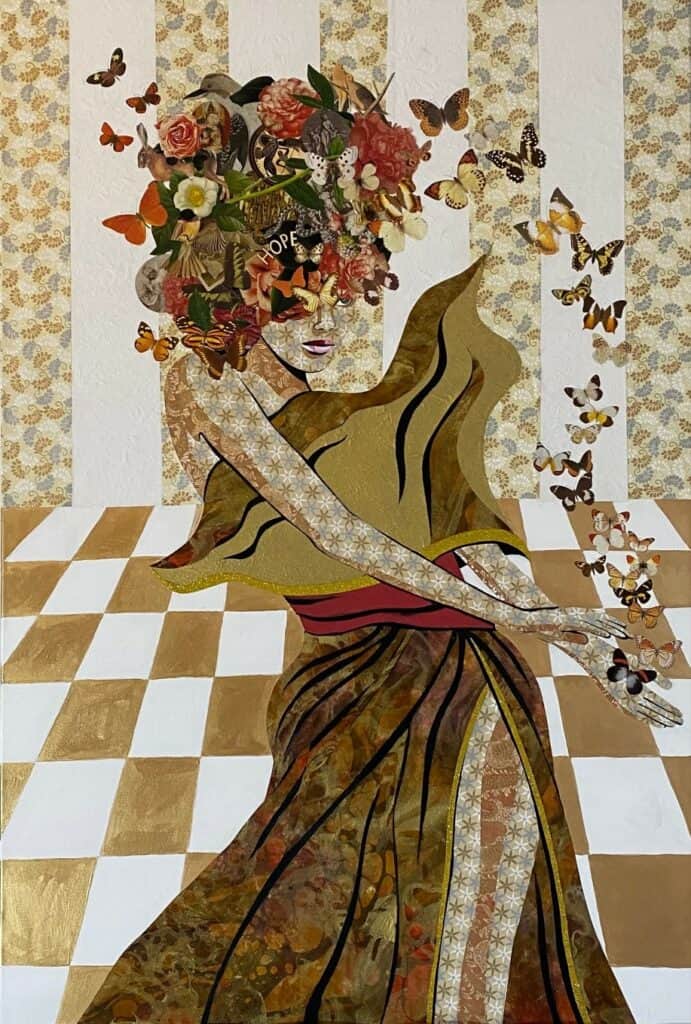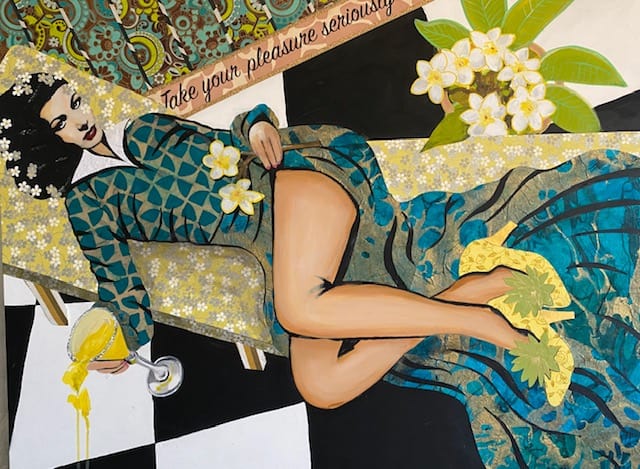Cabell Molina Reconstructs Female Consciousness

Painter and collage artist Cabell Molina takes the traditional patriarchal notion of a woman’s place and turns it on its head, or in the case of her images, on a woman’s head. Her visually compelling and layered work presents on the surface as a beautiful image then on closer inspection reveals a complex story of a woman defining her own place and perspective. A former advertising art director, Molina uses images cut out of magazines and books in her collages, enticing the viewer to look deeper and conspire with the subject to reclaim her own power.
Molina’s work has touched a responsive chord and has been in shows and private collections around the world. Two of her pieces were recently featured in CNN Style and New York Times The Cut.
Molina comments, “I used to do ads for big corporations and now I tear them up and put them in collages. It feels like an act of rebellion, especially ads targeted to women and girls who are vulnerable.” Being an art director also gave her a love of design and typography and graphic skills she employs as she mixes media and patterns. She comments, “Collage is an amazing medium to allow the artist to surprise the viewer.”
She describes her artistic technique as deconstruct and reconstruct. “Typically, I will cut up a lot of magazines and use those elements as well as hand-made papers, wallpaper, fabric and things that have cool patterns. I used to use a lot more magazines but I’ve moved five times. Try carting around boxes of magazines,” she adds with a laugh, “I narrowed it down to one box. Your lifestyle will definitely change your artistic materials.”
Her Hamptons lifestyle also reflects her changes morphing from “Renting a two-bedroom house in the ‘80s with fifteen friends,” to time spent in Bridgehampton where she works with The White Room Gallery or enjoying Montauk.

Molina’s thematic explorations stem from her own life decisions. “I chose to quit my career in my 30’s and stay home with my two young boys,” says Molina, “I don’t regret that at all but when you leave a career it can be challenging because it’s tied to your identity. I was really happy to make the choice but I began to feel a little lost and powerless. I was raised by a 1950’s traditional mother whose message was the most rewarding thing you can do in life is stay home and take care of a family. My own life choices as well as the ones I was raised with have culminated into this fascination with female representation through the pre- and post-feminist movement.”
For example, she’s working on a new series where she will take a depiction of a woman from a 1950’s catalogue then rewrite the story of what is happening by putting them in a different situation where they are empowered, transforming the narrative. This might be a prim and proper girl in a suburban setting reading The Joy of Sex or a woman lounging around a pool with the shadow of a man who could be her boy toy. Molina explains, “It’s a new narrative with old elements. My constant theme is self-empowerment and confidence for women.”
For Molina the personal and the political are intertwined, “When you feel powerless, art gives you a sense of purpose and catharsis. Put it down on the canvas or if you’re a writer put it on the page or if you’re a musician sing about it. We’re so out of touch with what is tactile and real and more than ever it’s important to have original art.”
Ultimately it is a deep human emotional connection that binds Molina to her work. “I am so lucky to have amazing female friends. I love to see resilient women carving out their own path. I am in awe of the female experience, it’s so nuanced and complicated and confusing… and satisfying.”















![Experience the epitome of coastal country living in this newly constructed, quality craftsmanship waterfront home on James Creek, leading to Peconic Bay. With 80± ft. of prime waterfront, 4060 Ole Jule Lane showcases thoughtfully landscaped grounds, a bluestone patio, outdoor shower, and a refreshing saltwater pool. Represented by @nataliealewis of @coldwellbanker. [link in bio]](https://hamptonsrealestateshowcase.com/wp-content/uploads/sb-instagram-feed-images/467188671_18474458155030135_7164624532118372206_nfull.webp)
![Welcome to 122 Mill Pond Lane, an impeccably conceived and meticulously maintained residence in a dramatic west-facing setting on Mill Pond. Throughout the home are thoughtfully considered elements that reinforce the home’s clean, modern sensibility. Represented by @kraelyllahamptons of @hamptonsrealestate. [link in bio]](https://hamptonsrealestateshowcase.com/wp-content/uploads/sb-instagram-feed-images/466787127_18474263443030135_2753720635361764689_nfull.webp)

![Perched atop the dunes at Louse Point sits 2 picturesque homes at 88 & 86 Louse Point Road, both perfect for enjoying all seasons that East Hampton has to offer. Each thoughtfully designed home maximizes the topography to allow seamless indoor/outdoor living and entertaining. Represented by @petrieteam of @compass. [link in bio]](https://hamptonsrealestateshowcase.com/wp-content/uploads/sb-instagram-feed-images/466619407_18473886082030135_7330054085188815713_nfull.jpg)
![Get cozy every Friday at Canoe Place Inn! 🍫🔥 Gather around the fire on our Garden Lawn for Fireside Fridays all season long, where evenings are warmed up with hot cider, hot chocolate, s’mores, and cocktails. Enjoy live acoustic music on select dates, and with your first drink, receive a complimentary s'mores kit! [link in bio]](https://hamptonsrealestateshowcase.com/wp-content/uploads/sb-instagram-feed-images/466374901_1761070534297706_6837753985329213061_nfull.jpg)
![Musical Superstar and Sag Harbor resident Billy Joel has listed his 26± acre Long Island estate for $50M. Assembled over time on adjoining parcels, the Centre Island compound features a 20,000± sq. ft. main home plus several additional structures—all with access to 2,000± ft. of private shoreline boasting a dock and a boat ramp. [link in bio]](https://hamptonsrealestateshowcase.com/wp-content/uploads/sb-instagram-feed-images/465973748_18473309701030135_6935355293028123088_nfull.jpg)
![51 Mashomuck Drive presents an exquisite estate spanning 1.1± acres with 145± ft. of bulk-headed waterfront. The main residence, offering captivating vistas of Sag Harbor Bay and Shelter Island, encompasses 7,800± sq. ft. of living space, boasting 7 beds, 9.5 baths, and a media room/gym area. This turn-key retreat embodies opulence and comfort, inviting a life of unparalleled luxury. Represented by @cindyascholtz and @jvonhagn of @compass. [link in bio]](https://hamptonsrealestateshowcase.com/wp-content/uploads/sb-instagram-feed-images/466104990_18473128246030135_2802294086252776198_nfull.jpg)
![In a prime East Hampton Village location, 64 West End Avenue is surrounded by preserved land and offers complete privacy situated on the shores of Georgica Pond with breathtaking sunset views. With both ocean and pond views, residents can indulge in swimming and sunbathing at the waterside gunite pool. Represented by @marthagundersenluxurybroker and @paulbrennanrealestate of @douglaselliman. [link in bio]](https://hamptonsrealestateshowcase.com/wp-content/uploads/sb-instagram-feed-images/465766544_18472922440030135_758297788107249653_nfull.jpg)
